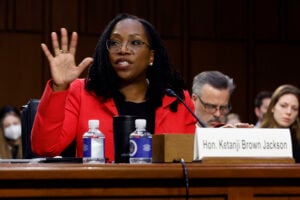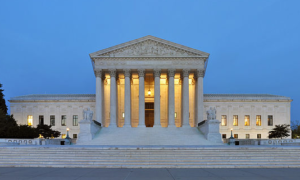Despite
the
cringy
sloganeering
Nancy
Pelosi
is
lying
at
us
with,
reasonable
people
understand
that
Congress
is
trying
to
get
rid
of
TikTok.
And
after
a
majority
vote
in
favor
of
the
ban
at
the
house,
it’s
looking
like
Congress
may
actually
pull
together
enough
to
put
the
squeeze
on
the
dance
app.
It’s
all
in
the
name
of
“protecting
the
American
public,”
I
just
wish
they
had
that
same
energy
for
student
loans
debt
or
healthcare
for
all
or
any
of
the
stuff
that
people
are
actually
requesting.
If
it
also
passes
in
the
Senate,
it
is
unlikely
the
fight
ends
there
—
that
will
just
motivate
ByteDance
to
take
the
squabble
to
court.
From
Bloomberg
Law:
Once
again,
the
US
government
is
aiming
to
shut
down
TikTok
unless
it’s
divested
from
Beijing-based
ByteDance.
But
the
company
has
made
clear
it
has
no
intention
of
selling.
Indeed,
TikTok’s
management
vowed
in
an
internal
memo
to
staff
“we
will
move
to
the
courts
for
a
legal
challenge”
if
the
bill
winding
its
way
through
Congress
is
signed
into
law.That
sets
the
stage
for
a
watershed
legal
battle
between
the
US
government
and
the
offspring
of
a
$240
billion
startup
that’s
come
to
define
China’s
growing
technological
muscle.
The
outcome
could
define
the
business
landscape
for
Chinese
companies
like
Tencent
Holdings
Ltd.
and
PDD
Holdings
Inc.’s
Temu
with
growing
US
ambitions.
And
it’s
a
test
of
how
Beijing
will
respond
to
growing
pressure
on
homegrown
champions
from
ByteDance
to
Huawei
Technologies
Co.
The
proposed
bill
in
fact
deliberately
calls
out
the
potential
to
circumscribe
apps
from
countries
that
count
as
foreign
adversaries.
Might
be
hard
for
most
to
stomach
this
much
drama
over
an
app
on
teenagers’
phones,
but
them’s
the
facts.
Billions
of
dollars
are
at
stake
and
it’s
not
just
for
for
ByteDance.
The
outcome
of
this
case
could
set
precedent
for
how
massively
popular
foreign
apps
are
regulated
in
the
country
for
years
to
come,
not
to
mention
open
a
massive
power
vacuum
for
the
silly
app
that
also
doubles
as
a
massive
news
and
information
platform
market.
TikTok
Digs
In
to
Fight
US
Ban
With
170
Million
Users
at
Stake
[Bloomberg
Law]
US
Supreme
Court
Scrutinizes
Anti-Camping
Laws
Used
Against
The
Homeless
[Reuters]
 Chris
Chris
Williams
became
a
social
media
manager
and
assistant
editor
for
Above
the
Law
in
June
2021.
Prior
to
joining
the
staff,
he
moonlighted
as
a
minor
Memelord™
in
the
Facebook
group Law
School
Memes
for
Edgy
T14s.
He
endured
Missouri
long
enough
to
graduate
from
Washington
University
in
St.
Louis
School
of
Law.
He
is
a
former
boatbuilder
who
cannot
swim, a
published
author
on
critical
race
theory,
philosophy,
and
humor,
and
has
a
love
for
cycling
that
occasionally
annoys
his
peers.
You
can
reach
him
by
email
at cwilliams@abovethelaw.com and
by
tweet
at @WritesForRent.










 Kathryn
Kathryn


